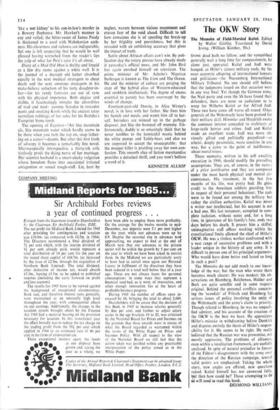The OKW Story
The Memoirs of Field-Marshal KeiteL Edited by Walter Gorlitz. Translated by David Irving. (William Kimber, 50s.) STONE dead bath no fellow; and the vanquished generally wait a long time for compassionate, let alone just, appraisal. Keitel and Jodl were hanged, as Hitler's ciosest military tools, by the most eccentric offspring of international lawyers and politicians—the Nuremberg International Military Tribunal. No one should still believe that the judgments issued on that occasion were in any way final. Yet though the German army, the Nazi party and even the SS have found their defenders, there are none so audacious as to weep for Wilhelm Keitel or for Alfred Jodi. These two have come off worse all round. Other generals of the Wehrmacht have been praised for their military skill; Himmler and Heydrich evoke the common interest conceded to architects of large-scale horror and crime. Jodl and Keitel made an excellent team; Jodl was more ob- viously gifted and politically prejudiced—an atheist, deeply pessimistic, more sensitive in one way, but a cynic to the point of indifference about moral issues.
These memoirs, written in his cell awaiting execution in 1946, should modify the prevailing assumptions. They are, of course, in the nature of a piece justificative and they are composed under the most harsh physical and mental cir- cumstances. His treatment, in the last few months of his life, was pretty bad. He gives credit to the American soldiers guarding him in respect of their personal behaviour. The cads were to be found not among the military but rather the civilian authorities. Keitel was never a writer nor intellectual, but his account is not a bad one. His last testament, compiled in com- plete isolation, without notes and, for a long time, in ignorance of his family's fate, ends two days before his death. It proves him a skilful, unimaginative staff officer working within the constitutional limits allowed the chief of Hitler's OKW. He was a tireless worker confronted with a vast range of successive problems and with a leader unique in the history of any army. It is difficult to pursue one of his principal arguments. Who would have done better and lasted so long in such a post?
The Memoirs do not add much to our know- ledge of the war, but the- man who wrote them becomes much clearer. He was modest; his ob- servations on Blomberg, Reichenau, Halder and Beck are quite sensible and in some respects original. Behind the personal conflicts concern- ing the 'scandals' of Fritsch and Blomberg lay serious issues of policy involving the unity of the Wehrmacht and the army's claim to priority. Though related to Blomberg, he was no unquali- fied admirer, and his account of the creation of the OKW is the best we have. He appreciates Hitler's mistake in withdrawing before Dunkirk and disputes entirely the thesis of Hitler's respon- sibility for it. He seems to be right. He really believed that the Russian war was preventive, not merely aggressive. The problems of alliances, even within a totalitarian framework, are usefully analysed. In spite of natural prejudice in favour Of the Fiihrer's disagreement with the army over the direction of the Russian campaign, several valid points are emphasised. Taking the whole story, new angles are offered, new questions raised. Keitel himself has not answered fully, biit then how could he? Those attempting to do so will need to read this book.
DESMOND WILLIAMS


































 Previous page
Previous page